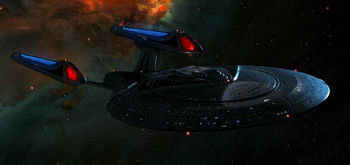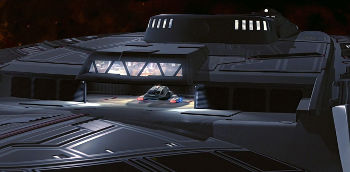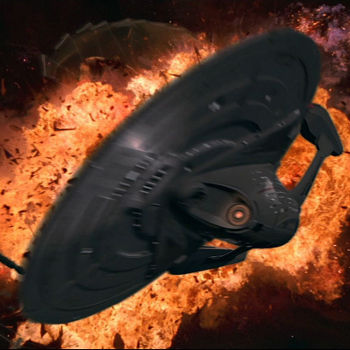Sovereign class (STA)
The success of the Galaxy class made it influential on starship designers already hard at work on the next major explorer class. The Sovereign class began development in 2368 after Starfleet Command felt that starship probing deep space would need to be better equipped to handle hostile and more technologically-advanced races, such as the Borg. The new design gained greater importance after the discovery of the Bajoran wormhole in 2369, and the discovery of damage to spacetime caused by existing warp drive systems. The Sovereign class was commissioned with the launch of the U.S.S. Sovereign NX-73811 (later NCC-73811) in late 2371.[1]
The Sovereign class used a new variable-geometry warp drive that was able to replicate the same qualities as the Intrepid class' variable pitch nacelles without the need for adjustable pylons. The advanced warp drive was only possible with small, highly-specialized isolinear systems located in each nacelle, able to coordinate the movement of the warp coils inside the nacelle and their emissions through multiple subspace frequencies. The result was that the Sovereign class did no detectable damage to spacetime and could enter warp speeds faster than ships a tenth of its mass.[1]
Sovereign class shuttlebay (ST09)
Like the Galaxy class before it, the Sovereign class had extensive laboratories, sensor systems, and subspace transmitters that made it an excellent deep-space explorer. The vessel had two shuttle bays:[1] the main shuttlebay on the primary hull[2] and a recovery system on the far aft of the engineering hull.[1] A large captain's yacht was also included in the design and was made more functional as an auxiliary vehicle with the inclusion of a small matter/antimatter power core and two warp nacelles.[2] Diplomatic receptions could be held on a planetary surface inside the captain's yacht,[1] or aboard the ship with its extensive diplomatic facilities.[2]
Sovereign class (ST09)
Command and control systems were integrated into the design's communications systems,[1] allowing the Sovereign class to act as a flagship for fleet deployments. The design included significant firepower, including a dedicated quantum torpedo launcher and multiple Type-Xa phaser strips allowing both offensive and defensive firing modes.[3]
The Sovereign class sickbay shared a design substantially similar to that on Intrepid class ships. The entire room was fitted with holographic emitters and had an independent computer system that could project the sophisticated Emergency Medical Hologram, a holographic doctor that was designed to supplement the ship's medical personnel if they were killed, injured, or overwhelmed.[3]
The class didn't include civilian facilities in the same way as the Galaxy class did, but still contained many of the features that Starfleet crews had grown accustomed to,[1] including lounges,[2] extensive holodeck simulators,[3] gymnasiums, and even a small kitchen for the crew to cook, as many personnel often preferred hand-made food over replicated meals.[1]
Sovereign class vessels
U.S.S. Enterprise NCC-1701-E • U.S.S. Sovereign
Columbia Timeline
U.S.S. Bozeman NCC-1941-A • U.S.S. Enterprise NCC-1701-E • U.S.S. First Minister • U.S.S. Gibraltar NCC-75689 • U.S.S. Musashi • U.S.S. President • U.S.S. Roosevelt • U.S.S. Sovereign NCC-73811 U.S.S. Tempest (Columbia) • U.S.S. Tirpitz • U.S.S. Warspite
LUG Timeline
U.S.S. Enterprise NCC-1701-E • U.S.S. Gibraltar NCC-75689 • U.S.S. Independence NCC-90346 • U.S.S. Sovereign NCC-73811 • U.S.S. Yorktown NCC-90276
SFC Timeline
U.S.S. Affiliation • U.S.S. Agamemnon • U.S.S. Alliance • U.S.S. Association • U.S.S. Consortium • U.S.S. Directorate • U.S.S. Entente • U.S.S. Enterprise NCC-1701-E • U.S.S. Federation • U.S.S. Harrier • U.S.S. Solidarity • U.S.S. Sovereign • U.S.S. Unification • U.S.S. Unity
STA Timeline
U.S.S. Enterprise NCC-1701-E • U.S.S. Sovereign NCC-73811
STO Timeline
U.S.S. Enterprise NCC-1701-E • U.S.S. Sovereign NCC-74977 • U.S.S. Sovereign NCC-74977-A
Mirror Universe
I.S.S. Enterprise NCC-1701-E (Columbia-M2) • I.S.S. Enterprise NCC-1701-E (SVM) • I.S.S. Sovereign NC-30478 (STO-M)
Myriad Universes
U.S.S. Bozeman NCC-1941-A (SL) • U.S.S. Constellation (SV) • U.S.S. Davis NCC-74967 (Legacy) • U.S.S. Erebus (SV) • U.S.S. Legacy NCC-75001 (Legacy)
Armada
U.S.S. Aeon (Arma) • U.S.S. Alexandra (Arma) • U.S.S. Archangel (Arma) • U.S.S. Aries (Arma) • U.S.S. Atlas NCC-82745 (Arma) • U.S.S. Avalon (Arma) • U.S.S. Avatar (Arma) • U.S.S. Calabria (Arma) • U.S.S. Challenger (Arma) • U.S.S. Coburn (Arma) • U.S.S. Danvers (Arma) • U.S.S. Destiny (Arma) • U.S.S. Endurance (Arma) • U.S.S. Faithful (Arma) • U.S.S. Formidable (Arma) • U.S.S. Hickey (Arma) • U.S.S. Hope (Arma) • U.S.S. Horizon (Arma) • U.S.S. Hyperion (Arma) • U.S.S. Integrity (Arma) • U.S.S. Justice (Arma) • U.S.S. Legacy NCC-75001 (Arma) • U.S.S. Leviathan (Arma) • U.S.S. Majestic (Arma) • U.S.S. Midway (Arma) • U.S.S. Nimitz (Arma) • U.S.S. Odin (Arma) • U.S.S. Oxford (Arma) • U.S.S. Providence (Arma) • U.S.S. Rand (Arma) • U.S.S. Saratoga (Arma) • U.S.S. Sentinel NCC-1733-B (Arma) • U.S.S. Tempest (Arma) • U.S.S. Tiberius (Arma) • U.S.S. Wellington (Arma) • U.S.S. Yamato NCC-75808 (Arma)
Birth of the Federation
U.S.S. Antietam (BotF) • U.S.S. Ark Royal (BotF) • U.S.S. Bismarck (BotF) • U.S.S. Brigadier (BotF) • U.S.S. Colossus (BotF) • U.S.S. Croatan (BotF) • U.S.S. Essex (BotF) • U.S.S. Leviathan (BotF) • U.S.S. Lorraine (BotF) • U.S.S. Magnificent (BotF) • U.S.S. Marshall (BotF) • U.S.S. Midway (BotF) • U.S.S. Monterey (BotF) • U.S.S. Musashi (BotF) • U.S.S. Nelson (BotF) • U.S.S. Princeton (BotF) • U.S.S. Provence (BotF) • U.S.S. Ramillies (BotF) • U.S.S. Resolution (BotF) • U.S.S. Richelieu (BotF) • U.S.S. Roosevelt (BotF) • U.S.S. Sevastopol (BotF) • U.S.S. Tirpitz (BotF) • U.S.S. Valiant (BotF) • U.S.S. Vanguard (BotF) • U.S.S. Yamashiro (BotF) • U.S.S. Zuikaku (BotF)
Notes and References
- ↑ 1.0 1.1 1.2 1.3 1.4 1.5 1.6 1.7 Birch, Chris (Producer). The Command Division: Supplemental Rulebook. Star Trek Adventures. Book MUH051063 . Written by Jim Johnson, Nathan Dowdell, and Aaron Pollyea. Cover art by Eli Maffei. Internal artwork by Rodrigo Gonzalez, Connor Magill, Wayne Miller, Grzegorz Pedrycz, Ángel Alonso Miguel, Martin Sobr, Jack Kaiser, Nick Greenwood, Doug Drexler, Tobias Richter, David Metlesits, Michele Frigo, and Joseph Diaz.. Modiphius Entertainment Ltd.. June 2018.
- ↑ 2.0 2.1 2.2 2.3 Berman, Rick (Producer). Star Trek: Insurrection. Directed by Jonathan Frakes. Story by Rick Berman & Michael Piller. Screenplay by Michael Piller. Paramount Pictures. 11 December 1998.
- ↑ 3.0 3.1 3.2 Berman, Rick (Producer). Star Trek: First Contact. Directed by Jonathan Frakes. Story by Rick Berman & Brannon Braga & Ronald D. Moore. Screenplay by Brannon Braga & Ronald D. Moore. Paramount Pictures. 22 November 1996.



